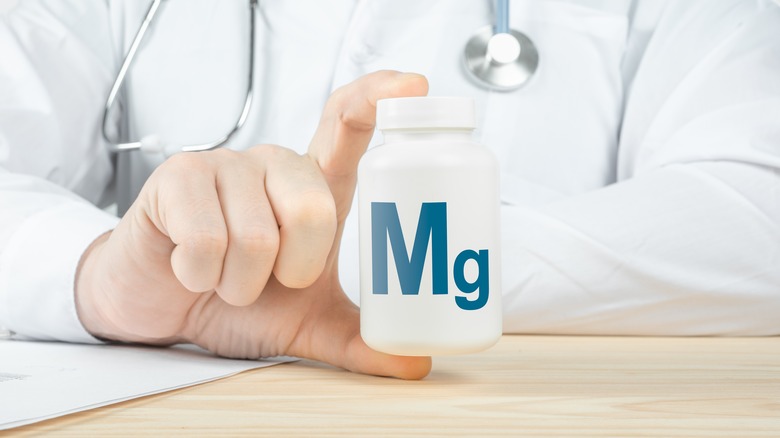Medications That Could Have Negative Interactions With Magnesium
According to the Academy of Nutrition and Dietetics (AND), magnesium is an important mineral for human health. More than 300 enzymes use magnesium to help carry out functions like making energy and building protein. Magnesium is also involved in muscle contractions, including the beating of the heart, and it helps keep bones strong. In addition, it helps regulate blood pressure and blood sugar.
The Harvard T.H. Chan School of Public Health states that the recommended dietary allowance (RDA) for magnesium is 400-240 mg per day for adult men and 310-320 mg for adult women. More is needed during pregnancy and breastfeeding, with about 350-360 mg being advised for pregnant women and 310-320 mg being recommended during lactation.
The National Institutes of Health's Office of Dietary Supplements notes that magnesium-rich foods include green leafy vegetables, legumes, nuts, seeds, and whole grains. It is also found in tap, mineral, and bottled waters, although the amount varies. While it is best to obtain magnesium through what you eat, sometimes, doctors recommend supplementation for certain conditions like celiac disease or type 2 diabetes (via AND). It is important to be aware of any potential interactions between magnesium and other medications that you might be taking.
Magnesium drug interactions
There are several drugs that can interact with magnesium. However, you should always consult with your doctor or pharmacist as well.
WebMD notes that magnesium may interact with particular types of drugs and antibiotics, increasing or decreasing their effectiveness or causing muscle problems. It can also decrease the absorption of drugs called bisphosphonates, which slow bone loss. Magnesium can act as a calcium channel blocker, so it may interact with certain blood pressure medications. Magnesium also helps relax muscles, so it may enhance the effect of muscle relaxants. It can also slow blood clotting, so it should not be taken with anticoagulant/antiplatelet medications. It can decrease the absorption of diabetes drugs called sulfonylureas, increasing the risk for low blood sugar. When magnesium is used as a laxative, antacids can reduce its effectiveness.
Magnesium can increase the effectiveness of the Parkinson's drug levodopa/carbidopa (Sinemet). In addition, it can decrease the absorption of the heart medication digoxin (Lanoxin). Water pills, like spironolactone (Aldactone), amiloride (Midamor), or triamterene (Dyrenium), can increase magnesium levels in the body. For this reason, magnesium supplementation is not advised. Further, magnesium can decrease the absorption of the drug gabapentin (Neurontin). On the other hand, it may increase the effects of a pain medication called ketamine (Ketalar). Finally, taking magnesium with the medication sevelamer (Renagel, Renvela) can cause magnesium levels to rise excessively.


